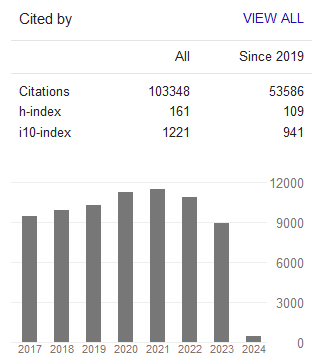Criteria for Performance Appraisal in Saudi Arabia, and Employees Interpretation of These Criteria
- Saleh H. Alharbi
Abstract
This study explores the criteria for evaluating performance, established as recently as 2017, by the Saudi Civil Services body (SCS), and which defines the methods and techniques for a fair and rational implementation of the appraisal system, and examines how employees perceive these criteria. Throughout, the research looked at the attitude of employees within public agencies, in the city of Tabuk, Saudi Arabia, vis-a-vis the newly implemented appraisal system, and at how they interpreted its’ modus operandi and its’ findings. The study made use of Qualitative methodology, wherein data collected from five public agencies on the basis of face-to-face interviews, sought to understand the employees’ perspective of the application of the current appraisal system and to fathom their experience of it. The sample size comprised 10 employees, two from each agency. The findings reveal significant public sector employees’ concern regarding the new appraisal system, the degree of accuracy in implementing the appraisal process. Employees’ concerns extended to the mechanisms are used to link between the appraisal grade and the allowance (pay for performance), to the nefarious influence of nepotism on the factors of fair play and accuracy. The question of how to raise the level of awareness of the new system among raters and ratees came to the fore during the face-to-face interviews.
- Full Text:
 PDF
PDF
- DOI:10.5539/ijbm.v13n9p106
Journal Metrics
Google-based Impact Factor (2023): 0.86
h-index(2023): 152
i10-index(2023): 1168

Index
- Academic Journals Database
- AIDEA list (Italian Academy of Business Administration)
- ANVUR (Italian National Agency for the Evaluation of Universities and Research Institutes)
- Berkeley Library
- CNKI Scholar
- COPAC
- EBSCOhost
- Electronic Journals Library
- Elektronische Zeitschriftenbibliothek (EZB)
- EuroPub Database
- Excellence in Research for Australia (ERA)
- Genamics JournalSeek
- GETIT@YALE (Yale University Library)
- IBZ Online
- JournalTOCs
- Library and Archives Canada
- LOCKSS
- MIAR
- National Library of Australia
- Norwegian Centre for Research Data (NSD)
- PKP Open Archives Harvester
- Publons
- Qualis/CAPES
- RePEc
- ROAD
- Scilit
- SHERPA/RoMEO
- Standard Periodical Directory
- Universe Digital Library
- UoS Library
- WorldCat
- ZBW-German National Library of Economics
Contact
- Stephen LeeEditorial Assistant
- ijbm@ccsenet.org
